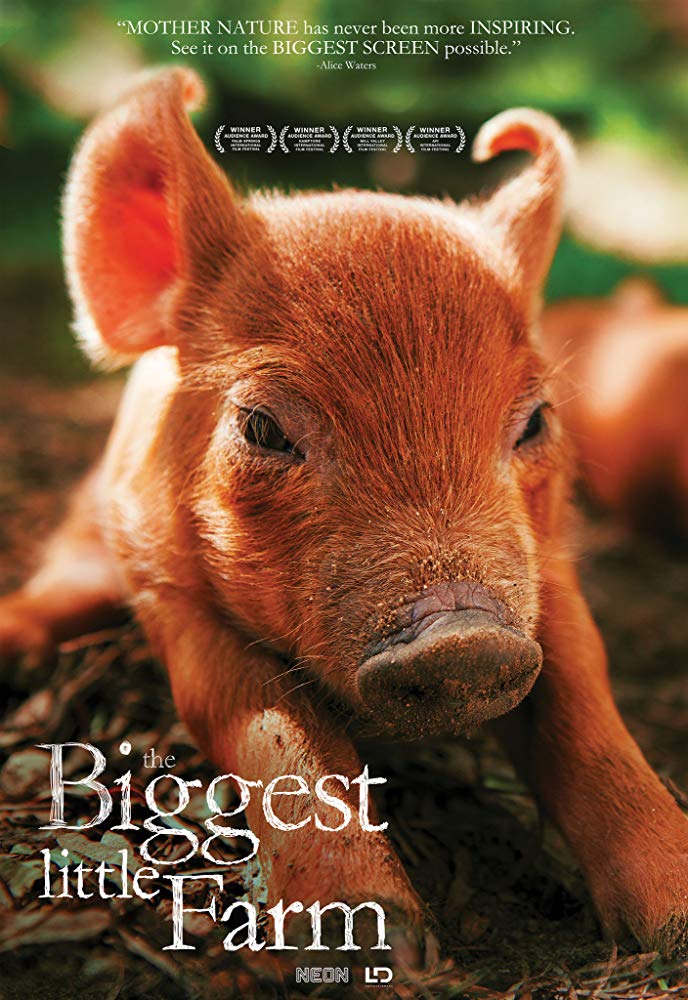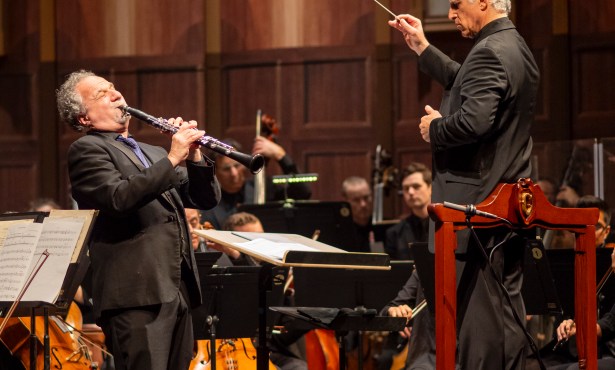SBIFF: Day 3: Farm to Film
Engaging Doc About Dirt-To-Bounty

After only two days of festival action, it may be unfair to make sweeping generalizations, but the strongest and most engaging “documentary with 805 roots award” may well go to The Biggest Little Farm, which drew capacity crowds. Never mind farm-to-table, this is a compelling and dramatic dirt-to-bounty tale of a small “traditional farm,” which transformed from an arid spread of Moorpark farmland to the thriving operation known as Apricot Lane Farms. It’s all about better farming with diversity and sustainability, many lessons learned “in the field,” and a metaphorical object lesson for a better humanity.
It may also be the film mostly likely to brush aside any skepticism audiences may have in terms of “docs about a farm,” partly thanks to the natural filmic and cinematographic powers of its subject and filmmaker, John Chester. A nature documentary photographer who moved with his wife, Molly, and their beloved (and now belated) dog Todd to the Moorpark property in 2011, Chester shared his film with the Friday evening audience at the Metro, which turned away many would-be viewers. (Head’s up, the film will get a two-week run at the Riviera Theatre in April).
As Chester summed it up before the film rolled, “This is the story of my wife and I. I was a doc filmmaker and I gave up that to start a farm eight years ago, and then ended up making a film about it.” What unfolds over the dramatic portrait of a farm’s evolution, a beautifully shot saga with dramatic arcs as they learn about the serial challenges of farming and the art of animal husbandry. The film is lined with John Chester’s intelligent and engaging narration and stunning nature photography that grows ever more beautiful as the farm expands into a (Moorpark, we thought we knew thee). The only note that rang false for this viewer were the musical notes: Jeff Beal’s quite lovely but misplaced orchestral, which added a Disney-fying gloss to a film crying out for more organic, earthy music. All in all, this is one of the biggest little docs in SBIFF this year.
Ironically, the film’s burst of early success has gotten in the way of the pressing daily farming duties. The film has already swept the festival circuit — Telluride, Toronto, Sundance and won an Audience Choice Award from the recent Palm Springs festival before this “homecoming” festival appearance. At SBIFF, the Chesters shared the spotlight with workers on the dedicated team that make the farm function, although, to borrow John’s quip, Emma the pig had to stay at home.
Other recommended fare this weekend: the poignant Estonaian film Take it Or Leave It, Zhang Yimou’s martial arts period piece Shadow, and the not-so-blissful angelic triplets — Angel, Angel Face, and the hypnosis-themed who-and-why dunnit Murderous Trance aka The Guardian Angel.
Films to See: Speaking of stunning nature imagery, one of the best and most lingering films I’ve caught in the first blast of festival films is the Vietnamese The Third Wife, a deceptively calm but melancholic and powerful tale of 19th-century life in Vietnam. Director Ash Mayfair somehow finds a harmonious and dramatically enhancing blend of idyllic natural beauty and a story indicting the sexist cultural traditions of forced marriage and polygamy — as if to spotlight the indifferent continuity and wonders of nature and time, in contrast to the misdeeds of humans.
Our heroine is the 14-year-old May (Nguyen Phuong Tra My, radiant and understated), the “third wife” of a wealthy landowner, who learns about the sexual and familial protocol of her place in the order of things. Other female characters don’t fare as well, and Mayfair shrewdly brings 21st-century censure (and cinematic poise and poetry) to 19th-century manners, touching on the still-burning subject of misogyny in the process. The Third Wife is clearly one of the best of the fest.
From another corner of injustice, dark history and human cruelty, the young heroine — turned ersatz boy — in director Ross Clarke’s The Bird Catcher is Esther (Sarah Sofie Boussnina). Daughter of a doomed Jewish family in Trondheim, Norway, in 1942, a nation in the clutches of Nazi control, Esther assumes a new male identity for survival on an anti-Semitic farmer’s land. There will be blood and shocking turns along the way, but war’s end is on the horizon in Clarke’s cleanly made tale, offering a perspective on WWII not normally dealt with.
Talking Points: If it’s Saturday, this must be a day for talk about film with high-profile people in the spotlights. Today’s SBIFF schedule is lined with multiple good excuses to duck into theaters, escape the rain and sample international cinema of the day. It is also a day of amole talk, when we get a chance to get up close and relatively personal with Oscar-nominated actors, Green Book’s Viggo Mortensen (3 p.m. at the Arlington) and The Wife’s Glenn Close (8 p.m. at the Arlington).



